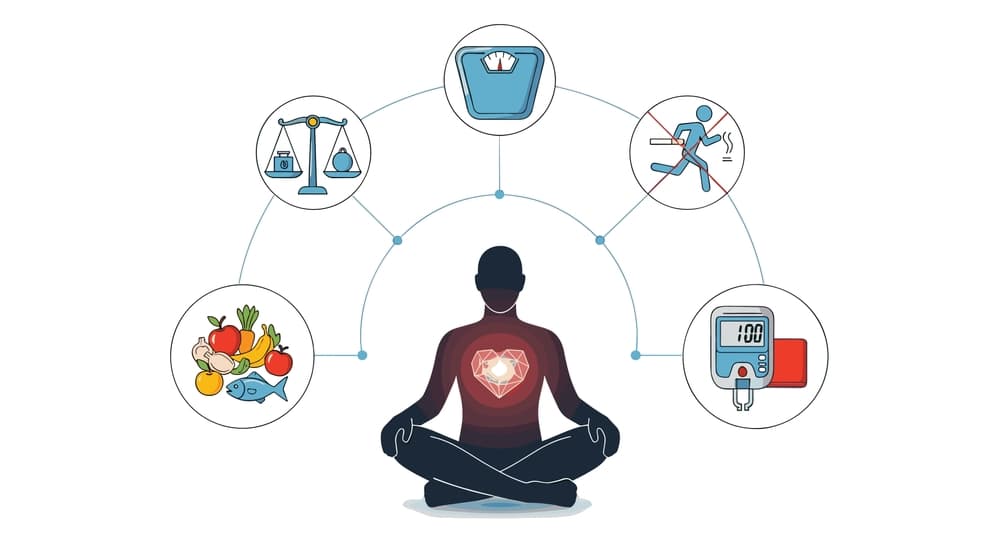How guided meditation helps with falling asleep faster


Sleep is an essential part of human life, which helps to keep the body and mind fresh. But due to work pressure, anxiety, and irregular lifestyle, many people suffer from sleep problems. Tossing and turning in bed at night, not getting enough sleep, these problems hurt daily life. Guided meditation can work as an effective solution in this situation.
Guided meditation is a type of meditation process, where the mind is calmed by following the voice instructions of an instructor. It not only helps to reduce mental stress but also relaxes the muscles of the body and calms the nervous system through deep breathing. As a result, both the mind and body are ready for rest, which helps you fall asleep quickly.
Today, we will discuss various aspects of this guided meditation and see how it can solve sleep problems. We will learn about its scientific basis, effectiveness, and easy methods of practicing it in daily life.
What is guided meditation?


Guided meditation is a type of meditation. A trained guide guides you into a deep meditation. This process is designed to guide the participant towards a specific goal, such as reducing stress, getting a deeper sleep, or achieving peace of mind.
Usually, we meditate in a guided manner, rather than in the way we normally do it ourselves. This type of guidance is provided directly, through audio, video, or live sessions. A trainer speaks slowly to help the other person become aware of their breathing and mental state.
How does it work?
1. Calming the mind: Under the guidance of the trainer, the person learns to put aside their distracting thoughts and focus their mind on a specific topic, such as breathing, body sensations, or a positive image.
2. Physical relaxation: The trainer instructs the body’s muscles to relax step by step. Through this, the person can eliminate tension or tension in their body, which is very important for good sleep.
3. Imagery and Visualization: Many guided meditation sessions involve imagining positive images or scenes to take the mind to a calm and pleasant place, such as walking by the sea or being among green mountains.
The Science Behind Meditation and Sleep


Calms the mind by changing brain waves
The University of Minnesota’s Center for Spirituality and Healing reports that mindful meditation increases alpha and theta waves and improves both attention and sleep.
When our brain gradually calms down before sleep, alpha and theta waves are activated. These brain waves are produced during meditation, which prepares us for sleep. Meditation acts as our mental switch.
Reduces Cortisol
A study published in JAMA Internal Medicine in 2015 found that participants who practiced mindful meditation for 6 weeks significantly reduced stress and insomnia.
Stress is the biggest enemy of sleep. Stress increases the level of the hormone cortisol in the body, which causes major problems in our sleep. Meditation reduces the level of cortisol and calms the mind, resulting in good sleep.
Increases Melatonin Production
A study published in the Journal of Biological Rhythms found that melatonin levels increased significantly in people who meditated for 30 minutes at night.
During sleep, the body produces the hormone Melatonin, which signals us to sleep. And regular meditation increases the amount of the hormone Melatonin, which results in faster sleep.
Reduces Racing Thoughts and Brings the Mind to the Present Moment
Many people’s brains are busy with excessive thoughts during sleep, which is the biggest obstacle to sleep. Guided meditation works to bring the mind to the present moment, thereby reducing the flow of thoughts and making it easier to prepare for sleep.
Easy Ways to Do Guided Meditation


1. Find a Quiet Place: Choose a quiet place to meditate where there will be no noise or distractions. It can be a corner of your bedroom, a quiet living room, or even your garden. Sit in a comfortable chair or lie down on your bed if you are meditating for sleep.
2. Wear comfortable clothes: Avoid wearing tight or uncomfortable clothes. Wearing light and loose clothes will help your body stay completely relaxed while meditating.
3. Silence your smartphone: Before starting meditation, put your mobile phone on silent or flight mode, so that no notifications or calls can disturb your meditation.
4. Choose a guided meditation session: There are countless free guided meditation sessions available on YouTube, Spotify, or various meditation apps like Headspace, Calm, and Medito. If you search for “Guided meditation for sleep” or “Sleep meditation”, you will find many sessions according to your needs.
5. Follow the instructions: When the meditation begins, listen carefully and follow the instructor’s instructions. When he tells you to take a deep breath or exhale, do so. When he tells you to focus on a specific part of your body, focus on that part.
6. Let the mind be quiet: Whenever a thought comes to your mind, let it go quietly without interrupting it. Meditation is not about eliminating thoughts, but rather letting them flow and not getting caught up in them.
7. Practice regularly: It may seem difficult to maintain your focus at first. But if you practice meditation for 5 to 10 minutes at a specific time every day, you will quickly feel its benefits.
Benefits of regular practice
Increase in physical capacity and fitness
Regular meditation increases our physical capacity. Because meditation strengthens the bones of the body, it increases endurance, due to which we can do any work effortlessly. And it is important to maintain fitness. By practicing this at a specific time every morning, both the body and mind remain fresh, which allows us to work well throughout the day.
Reduces stress and anxiety
Guided meditation calms our nervous system, which reduces the level of the cortisol hormone. And due to the reduction in the level of the cortisol hormone, stress and anxiety are reduced. It plays a very important role in keeping our minds calm. Regular practice can often help us remain calm in difficult situations.
Improves sleep quality
Regular meditation improves the quality of sleep the most. It helps you get into a certain rhythm, which results in a deep sleep as soon as you fall asleep. And if you sleep well, you can wake up early in the morning, and your mind and body are in good shape throughout the day.
Increases physical well-being
Guided meditation is not only beneficial for mental but also physical well-being. It helps in controlling blood pressure, maintaining a normal heart rate, and reducing body pain and tension. It can act as an alternative therapy for those suffering from chronic pain.
Key takeway from How guided meditation helps with falling asleep faster
Guided meditation not only changes the quality of sleep but also maintains physical and mental well-being. Due to work pressure, busyness, etc., we cannot be mentally healthy, and due to this, we have to face various kinds of problems. Regular guided practice keeps your mind calm, gives physical relaxation, and calms the nervous system. As a result, it is possible to fall asleep quickly, and the sleep is deep. Guided meditation can be done at any time. Just 10-15 minutes of practice every day can change your life, make you calmer, happier, and healthier.









